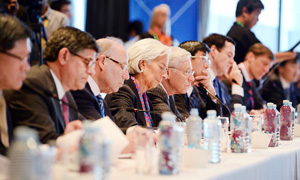
Get house in order, G20 tells emerging markets
London, February 22, 2014
The world's rich nations yesterday pushed back against emerging market complaints about the spillover effects of their monetary polices, saying they had to get their own houses in order and get with the agenda of boosting global growth.
As finance ministers and central bank chiefs from the Group of 20 developed and emerging countries gather ahead of a weekend meeting in Sydney, many are already talking at cross purposes.
Emerging nations want the US Federal Reserve to calibrate its winding down of stimulus so as to mitigate the impact on their economies and financial markets. Developed members reply that the troubles in the emerging world are mostly homegrown and domestic interest rates have to be set with domestic recoveries in mind.
A draft of the communique highlighted how the push for growth had trumped concerns about volatility in emerging markets that had threatened to overshadow the meeting.
"We commit to developing new measures to significantly raise global growth, while maintaining fiscal sustainability," the draft said.
"We recognise accommodative monetary policy settings in advanced economies will need to normalise in due course, in line with stronger growth."
Developed market policy makers see little risk of the recent market turmoil spiralling into the kind of contagion which prompted concerted and coordinated action from the G20 following the global financial crisis.
"Emerging markets need to take steps of their own to get their fiscal house in order and put structural reforms in place," US Treasury Secretary Jack Lew said at a financial conference in Sydney ahead of the ministerial meetings.
That was a sentiment very much echoed by the finance ministers of Japan, Britain and Germany.
Germany's Wolfgang Schaeuble told CNBC that emerging countries first had to do their homework, before demanding solidarity from the rest of the G20.
Japan's Taro Aso said the Fed's tapering of its stimulus programme was positive as it reflected an improving US economy, even if it raised the risk of sharp capital outflows from other countries.
"It is important for emerging economies to correct these things by making their own efforts," Aso said in Tokyo.
Developing nations from South Africa to Turkey to Russia have seen their currencies crumble in recent months as the prospect of higher returns in the US sucked foreign funds from their economies.
The head of the US Treasury also had pointed advice for other major nations, calling on China, Japan and Europe to make domestic demand the engine room of growth.
Australian Treasurer Joe Hockey is trying to bring some much-needed focus to the G20, proposing members sign on to ambitious growth agendas, and hold each other to account for delivering them.
And he's having some early success.
Setting such a growth target was "a good idea," IMF managing director Christine Lagarde said. "There is a potential for doing better and more, if only countries take some action."
Yet the idea of setting concrete goals for the G20 has caused nothing but friction in the past, with proposals to target fiscal and current account deficits coming to nothing in the end.
The proposal has already drawn scepticism, with a German government source criticising the idea as a "slightly antiquated form for economic planning".-Reuters







